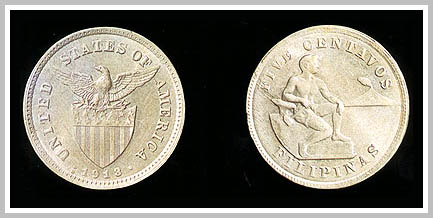| COINAGE
OF THE AMERICAN REGIME (1903-1935). While the 1918 5-centavo coin was
being minted in San Francisco, California, a fateful incident gave birth
to what would soon become a numismatic rarity. Exactly what happened is
not clear, as the mint records do not seem to reflect it. It would
appear that sometime during the production cycle, the obverse die containing
the date and the shield and eagle design was inadvertently replaced with
the obverse die of the 20-centavo coin of the same year. It is not known
how many of these coins had been minted when the error was finally discovered
and the proper obverse die put in place to complete die 2,750,000 5-centavo
coins produced that year. As a result, the erroneous batch of 5-centavo
coins carried on their obverse the broader shield and the smaller date
originally intended for the 20-centavo 1918-S. Born that year was what
is known in numismatic circles as a “MULE". A mule is a coin which carries
the design intended for another coin. In the U.S.-Philippine Series,
the only other instance of mule coinage is the 20-centavo 1928-M which
though not a mini error, bears the reverse design of a 5-centavo coin.
It has never
been determined how many 1918-S 5-centavo mules were produced during the
short time that the minting error had not been discovered and corrected.
It would appear though that a very small number managed to escape the mint
and went into circulation, such that almost every one that has been recovered
has been found to be very badly worn. The specimen featured in this page
is one (probably the best) of THREE 5-centavo 1918-S mules known to be
in UNCIRCULATED condition. As such, it is EXTREMELY RARE.
This 1918 "nickel"
has been likened to the famous U.S. 1913 Liberty Head Nickel. It is certainly
one of the rarest and, next only to the famous 1906-S Peso (much like the
U.S. 1804 Flowing Hair Dollar), is the most famous SIGNATURE COIN of the
U.S.-Philippine Series. Mintage unknown. (Philippine collection) |


